人教版九年级英语第八单元Unit 8 It must belong to Carla. Section A 最新(共60张PPT)
文档属性
| 名称 | 人教版九年级英语第八单元Unit 8 It must belong to Carla. Section A 最新(共60张PPT) | 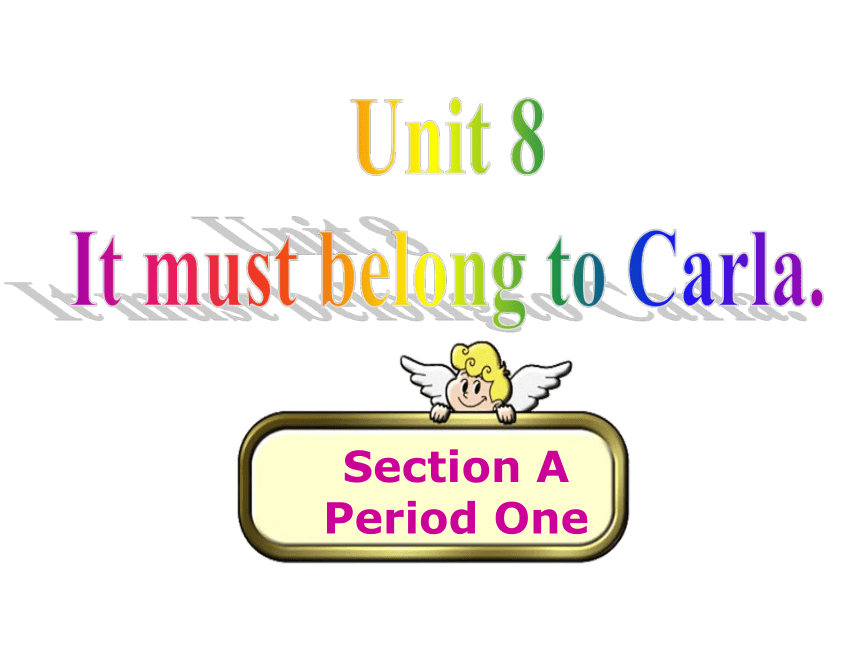 | |
| 格式 | zip | ||
| 文件大小 | 3.7MB | ||
| 资源类型 | 教案 | ||
| 版本资源 | 人教新目标(Go for it)版 | ||
| 科目 | 英语 | ||
| 更新时间 | 2022-10-10 14:51:14 | ||
图片预览

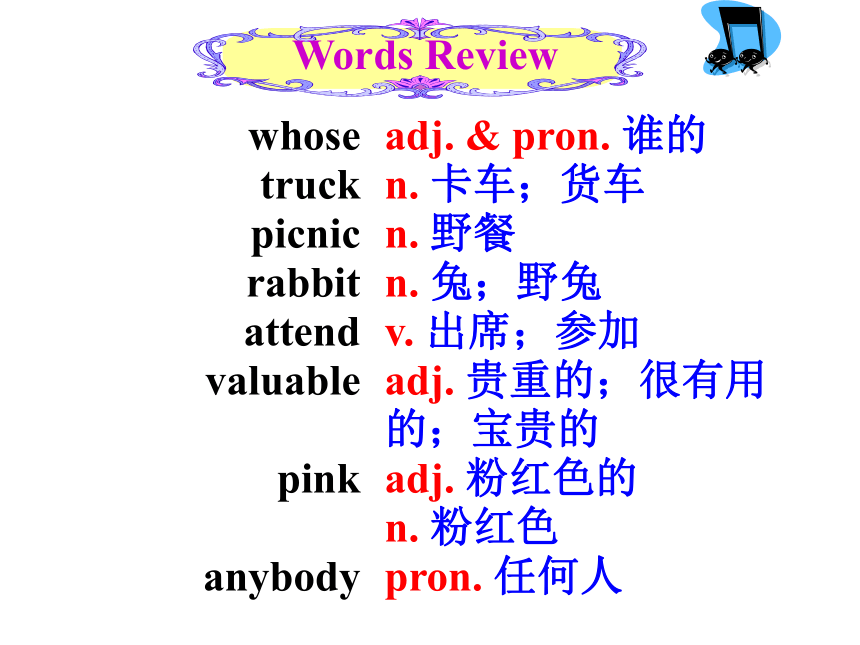
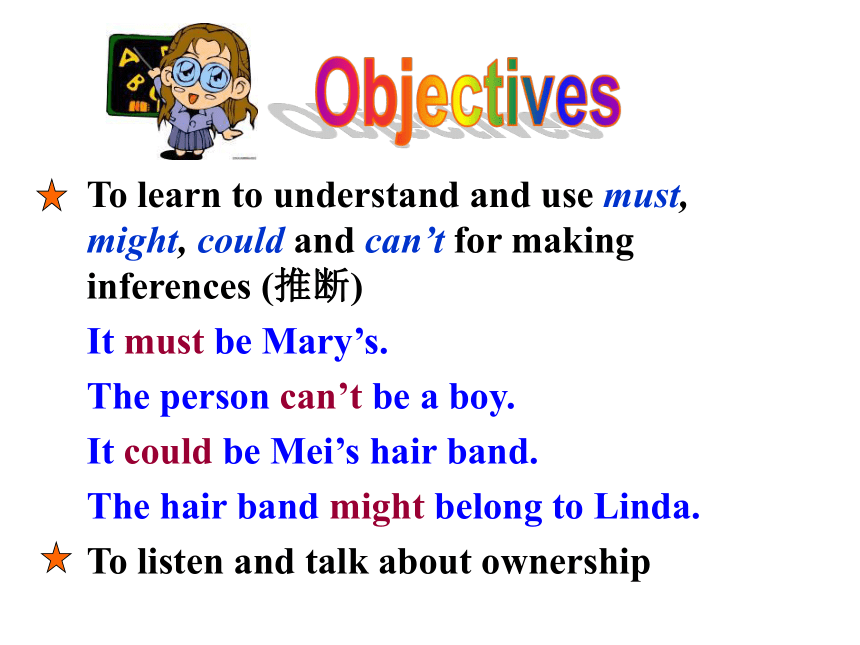
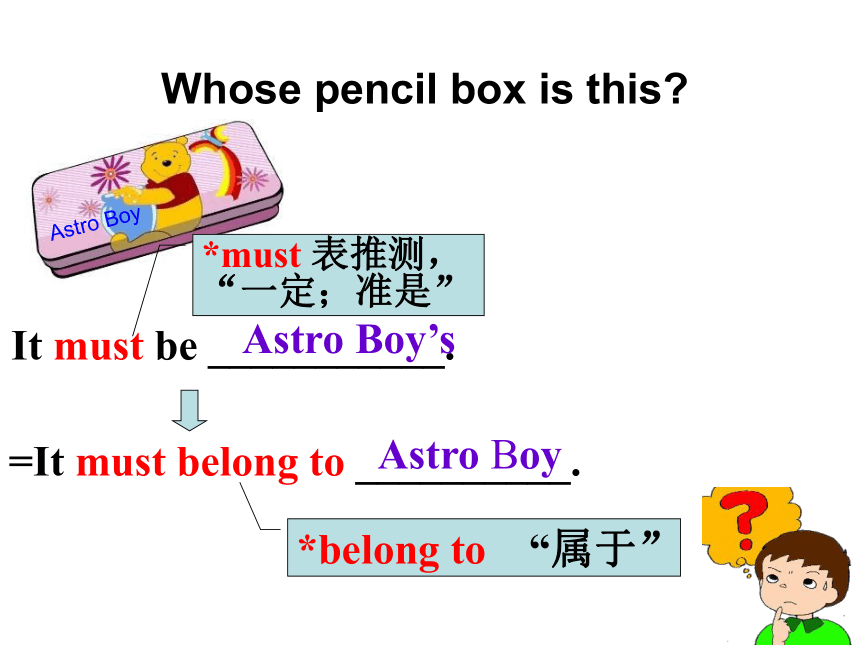
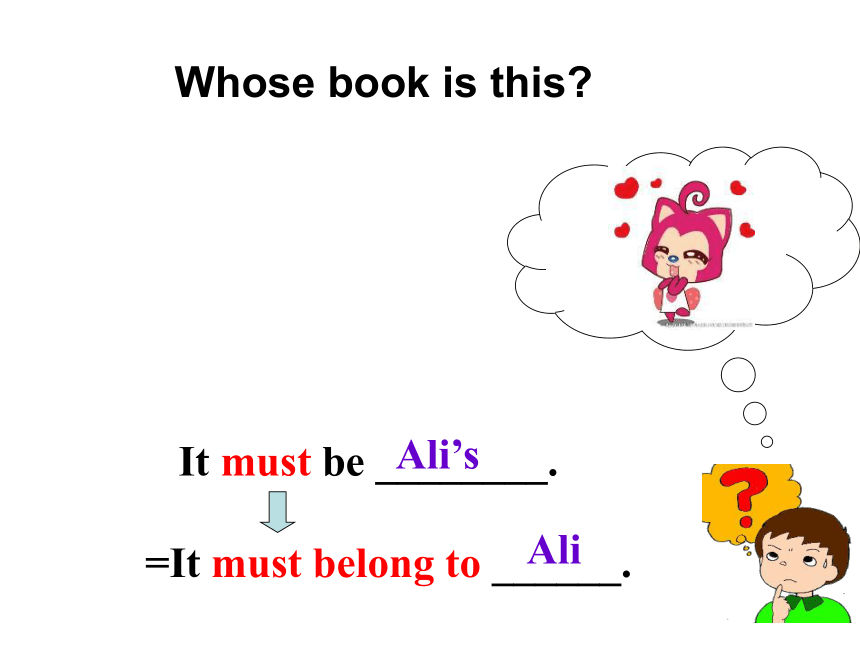
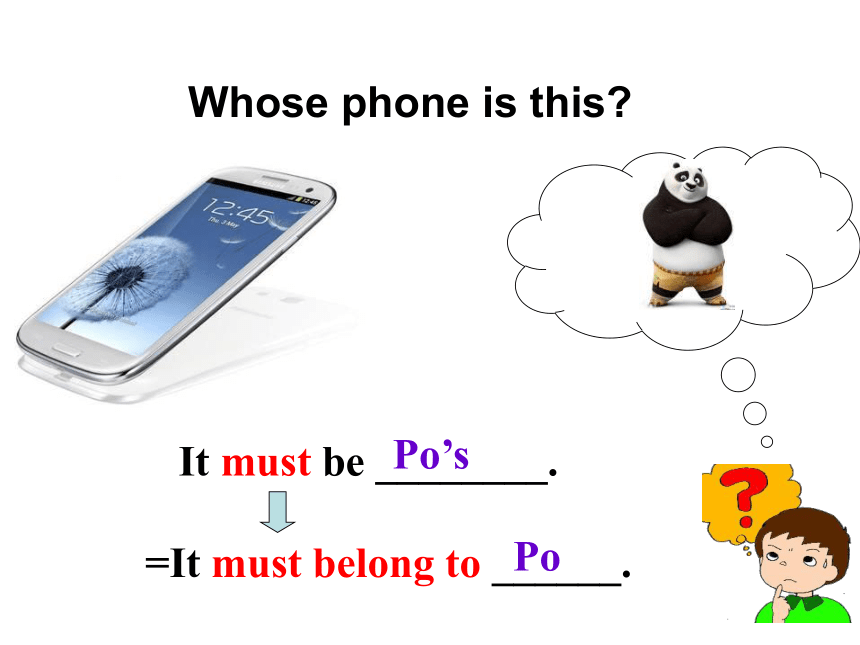
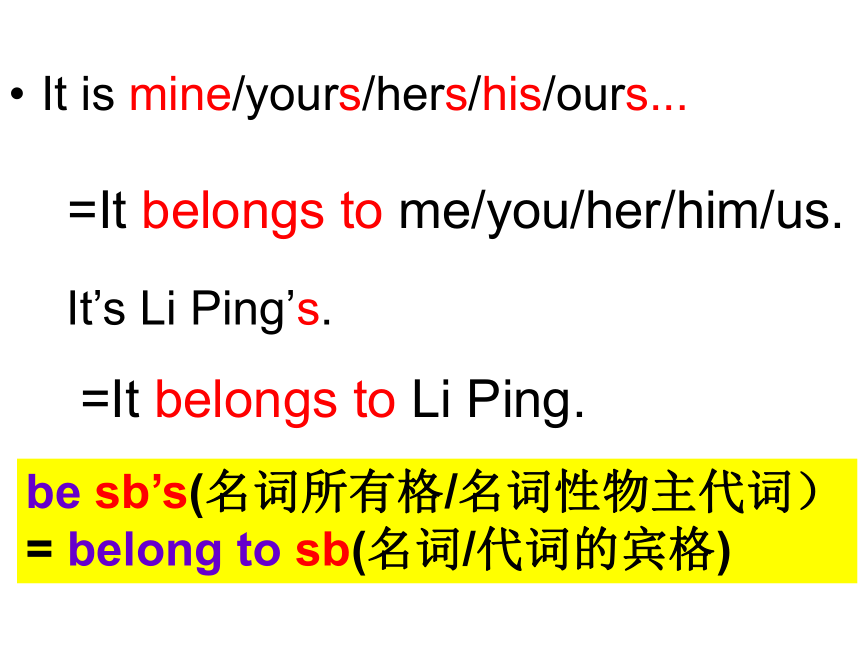
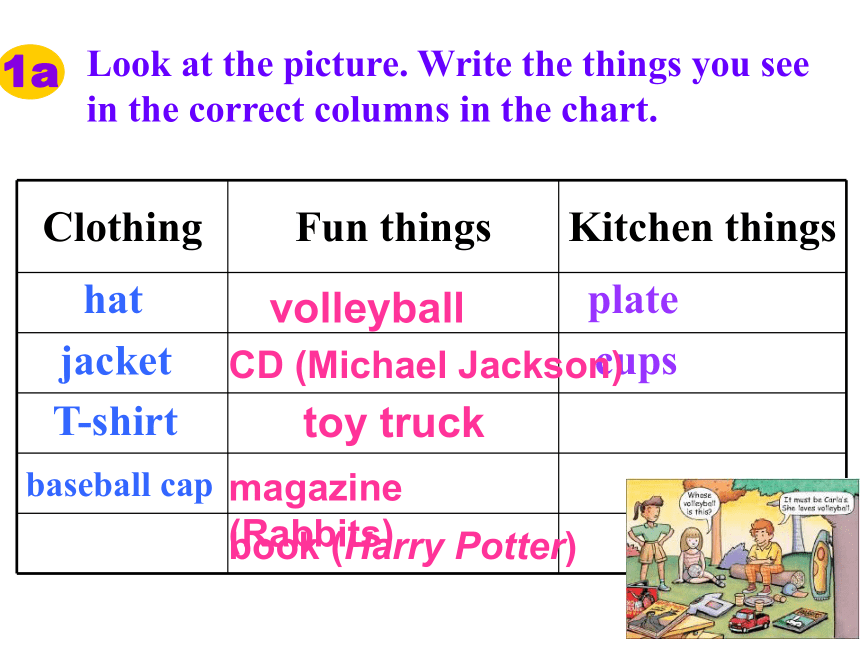
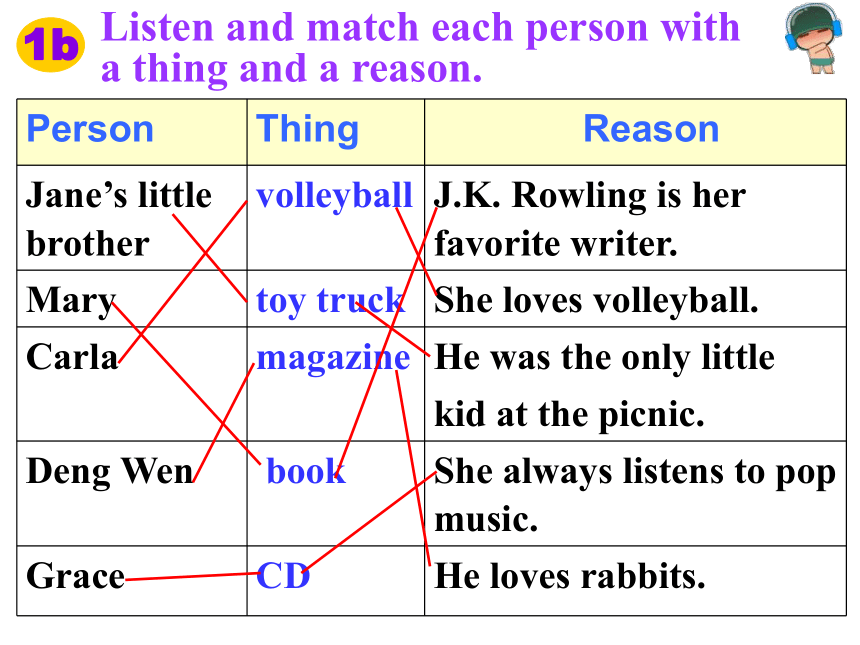
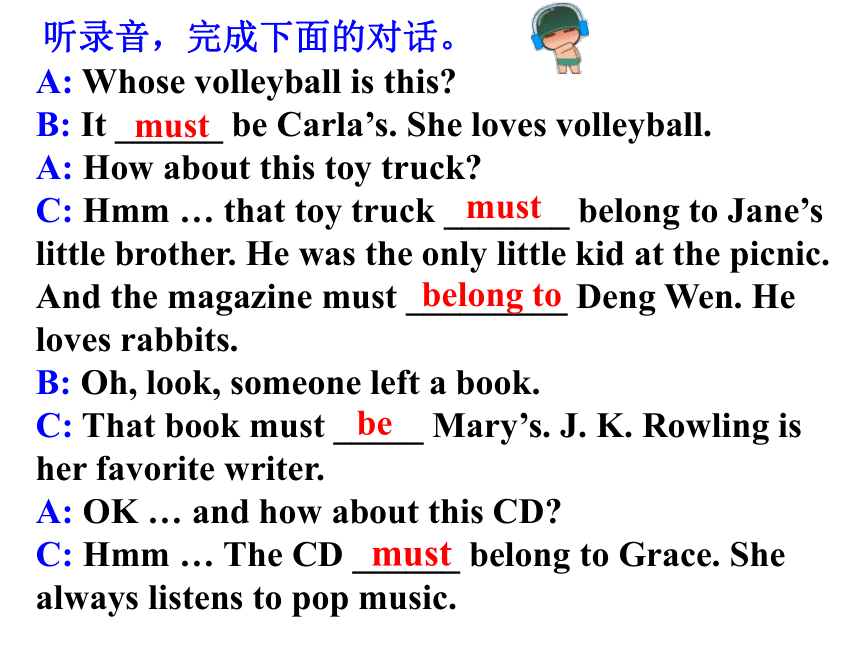
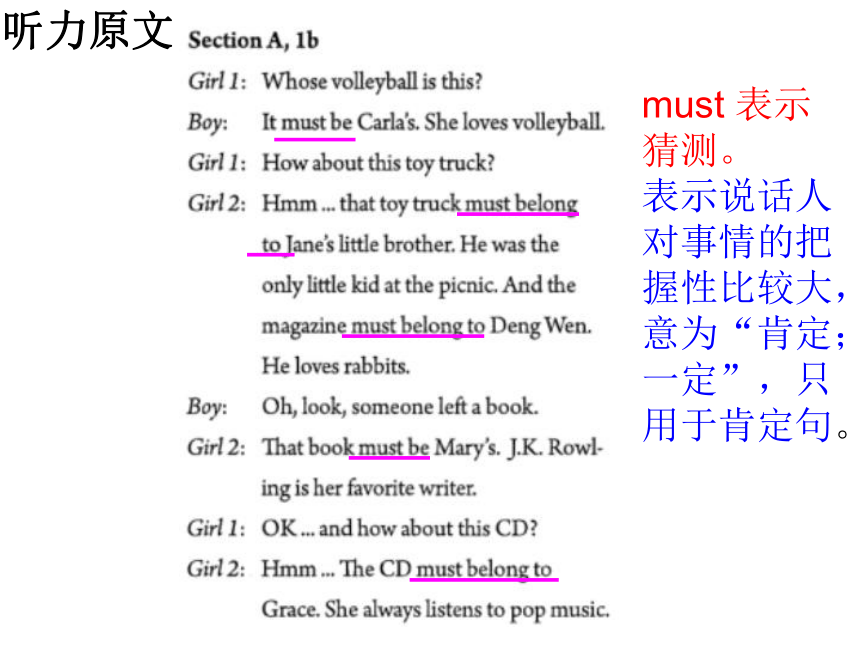
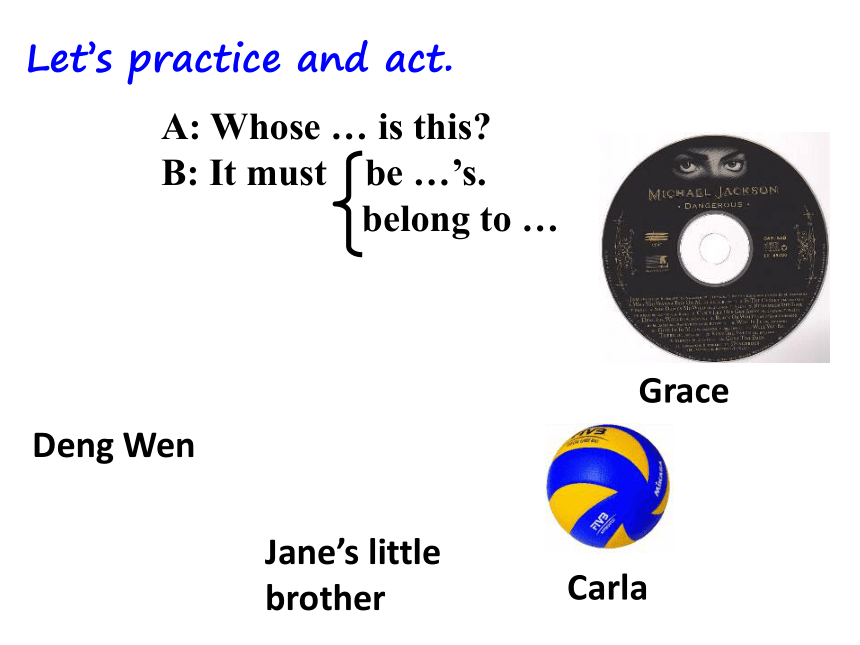
文档简介
(共60张PPT)
Section A
Period One
whose
truck
picnic
rabbit
attend
valuable
pink
anybody
adj. & pron. 谁的
n. 卡车;货车
n. 野餐
n. 兔;野兔
v. 出席;参加
adj. 贵重的;很有用的;宝贵的
adj. 粉红色的
n. 粉红色
pron. 任何人
Words Review
To learn to understand and use must, might, could and can’t for making inferences (推断)
It must be Mary’s.
The person can’t be a boy.
It could be Mei’s hair band.
The hair band might belong to Linda.
To listen and talk about ownership
Whose pencil box is this
It must be ___________.
Astro Boy’s
=It must belong to __________.
Astro Boy
*belong to “属于”
*must 表推测, “一定;准是”
Astro Boy
Whose book is this
It must be ________.
Ali’s
=It must belong to ______.
Ali
Whose phone is this
It must be ________.
Po’s
=It must belong to ______.
Po
It is mine/yours/hers/his/ours...
=It belongs to me/you/her/him/us.
It’s Li Ping’s.
=It belongs to Li Ping.
be sb’s(名词所有格/名词性物主代词)
= belong to sb(名词/代词的宾格)
Clothing Fun things Kitchen things
magazine (Rabbits)
hat
volleyball
plate
cups
jacket
T-shirt
CD (Michael Jackson)
toy truck
book (Harry Potter)
1a
Look at the picture. Write the things you see
in the correct columns in the chart.
baseball cap
Person Thing Reason
Jane’s little brother volleyball J.K. Rowling is her favorite writer.
Mary toy truck She loves volleyball.
Carla magazine He was the only little
kid at the picnic.
Deng Wen book She always listens to pop music.
Grace CD He loves rabbits.
Listen and match each person with a thing and a reason.
1b
A: Whose volleyball is this
B: It ______ be Carla’s. She loves volleyball.
A: How about this toy truck
C: Hmm … that toy truck _______ belong to Jane’s little brother. He was the only little kid at the picnic. And the magazine must _________ Deng Wen. He loves rabbits.
B: Oh, look, someone left a book.
C: That book must _____ Mary’s. J. K. Rowling is her favorite writer.
A: OK … and how about this CD
C: Hmm … The CD ______ belong to Grace. She always listens to pop music.
听录音,完成下面的对话。
must
must
belong to
be
must
听力原文
must 表示猜测。
表示说话人对事情的把握性比较大,意为“肯定;一定”,只用于肯定句。
Let’s practice and act.
A: Whose … is this
B: It must be …’s.
belong to …
Carla
Jane’s little brother
Deng Wen
Grace
Do you remember what modal verbs are
Modal verbs show the condition of verbs, e.g. ability, necessity, possibility, and must always be used with a main verb.
Can you list all the modal verbs you can remember
can
could
may
might
will
would
must
shall
should
ought to
need
Which modal verbs can be used to make inferences
can
could
may
might
must
Can you guess what it is
It could be ___________.
It also might be ___________.
a white vase
two faces
could/might “有可能;也许”
Can you guess what it is
It could be _______.
It also might be ___________.
a dog
two girls
Whose notebook is this
It must belong to Wang Ming.
It has his name on it.
belong to 属于
此句相当于It must be Wang Ming’s.
Whose notebook is this
It can’t be/belong to …
might be/belong to …
must be/belong to …
Deng Wen
Tom
Amy
Deng Wen
Whose skirt is this
It may belong to …
must belong to …
can’t belong to …
Jane
Mike
Whose volleyball is this
推测可能性:must﹥could﹥might﹥can’t
情态动词 用法 例句
must 表示很有把握的推测,意为“一定”,只用于肯定句。 The light is out. He must be sleeping.
could 和might 表示不太有把握的推测,意为“可能”。 The pen could / might be Joe’s. I saw it on his desk just now.
can’t 表示很有把握的否定推测,意为“不可能”。 The girl here can’t be Helen. Helen has gone to Beijing.
2a
Bob and Anna found a schoolbag at the park. Listen and write down the things in the schoolbag.
Things in the schoolbag
1. ____________________
2. ____________________
3. ____________________
T-shirt
hair band
tennis balls
Tips: The conversation contains quite a bit of information. Try to take as many notes as possible.
1. The person _____ go to our school.
2. The person _____ be a boy.
3. It _____ be Mei’s hair band.
4. The hair band ______ belong to Linda.
5. It _____ be Linda’s schoolbag.
must
can’t
could
might
must
2b
Listen again. Fill in the blanks.
听力原文
Make conversations using the information in 2a and 2b.
2c
Look! There’s a schoolbag
here.
What’s inside
There’s a
T-shirt, ...
The person must
go to…
Sample conversation
A: Here is a hair band. It could
belong to Mei. I know she has
one.
B: I don’t think so. It can’t be Mei’s.
This one is new, but hers is old.
This might belong to Linda.
A: Look! Whose toy car is this
B: It must be Jane’s little brother’s. Because he was the only little kid
at the picnic.
A: Here is a Chinese-English
dictionary. It could belong to
Mary. I know she has one.
B: I don’t think so. It can’t be Mary’s.
This one is new, but hers is old.
A: Look! Whose volleyball is this
B: It must be Carla’s. Because she
loves volleyball.
A: Look! Whose magazine is this
B: It must belong to Deng Wen .
Because he loves cats.
Cat Life
情态动词 must, might, could, can’t 后接动词原形,
可以表示对现在的情况的 .
It can’t ( )…
It might/could ( ) …
It must ( ) …
+ be (cold/a CD/ sb’s)
★
★
be Tony’s (是…的)
It must
推测
不可能
有可能
肯定
belong to Tony. (属于…)
及时小结才能巩固所学知识
Fill in the blanks with must, might /
could, can’t, belong to.
1. Whose earrings are these They __________ be Mary’s. she never wears earrings.
2. ---The telephone is ringing, but nobody answers it.
---He _______________ be out.
- “Whose is this book Oh, it _____________ Mary’s. Her name is on the back.”
- “No, it __________ me, she gave it to me yesterday.”
can’t
may/might
must be
belong to
1. It must belong to Carla.
belong to 意为“属于”,它一般不用于
进行时态和被动语态。如:
The hair band belongs to Anna. (√)
The hair band is belonging to Anna. (×)
The hair band is belonged to Anna. (×)
此外,belong to sb. 通常可以和名词性物主代词或名词所有格(一般是’s 所有格)互相转换。
如:
The blue jacket belongs to him / Jerry. →
The blue jacket is his / Jerry’s.
belong to sth
指某物与某处有一定关联或指某人是某团体、组织的一员
I belong to Shanghai.
He has never belonged to any organization.
2.picnic n.野餐;(自带食物的)郊游,野餐
at the picnic 吃野餐
have a picnic进行野餐
1. This book _____ be Carla’s. Her
name is on the book.
2. Jack’s bike is blue, so this yellow one
______ be his.
3. The guitar ______ belong to Alice.
Only she plays the guitar here.
4. - What do you think “upset” mean
- I’m not sure. It ______ mean sad.
Use proper modal verbs to fill in the blanks.
must
can’t
must
might
Whose schoolbag is lost
Read the dialogue in 2d, then answer the questions below.
3. Could her schoolbag be stolen Why
4. Could her schoolbag still be at the park Why
2. What’s in the schoolbag
Check the answers!
Linda’s schoolbag is lost.
No, it can’t be stolen, because there is not anything valuable in her schoolbag.
3. Could her schoolbag be stolen Why
4. Could her schoolbag still be at the park Why
Yes. She left early, before the rest of her friends and someone must have picked it up.
Whose schoolbag is lost
2. What’s in the schoolbag
There are Linda’s books, her pink hair band and some tennis balls in the schoolbag.
may/might/can’t/could/must be+地点
may/might/can’t/could/must be+done
may/might/can’t/could/must +have done
Do you know the meanings of the following phrases and sentences
Read and try to recite the conversations in 5-10 minutes.
1. Read the dialogue aloud for a few minutes by yourself;
2. Role play in groups;
3. Role play in front of the class.
We’ll see which group does the best.
2d
Tips: 1. The person playing the role of the mother should act the part and speak with a lower voice at a slower and calmer pace.
2. Role-play the conversation twice, switching roles each time.
Linda’s really worried. She can’t find her schoolbag. She _________________ yesterday so it ___________ in the music hall. There isn’t anything valuable in her schoolbag. So it ________ stolen. Then she remembers that she ______________ after the concert and had her schoolbag with her ____________. So it ______________ at the park. And she thinks somebody must have _____________. Linda will call them now to check if anybody has it.
Fill in the blanks according to the conversation.
attended a concert
might still be
can’t be
went to a picnic
at the picnic
could still be
picked it up
2. Well, where did you last put it
last adv. 上次; 最近的一次; 最后一次
last除用于句末外, 还常置于句子中间。
e.g. When I last saw her, she was
working in Shanghai.
我上次见她时,她在上海工作。
When did you see him last
你最近见到他是什么时候?
3. I attended a concert yesterday so it might still be in the music hall.
attend 正式用语
vt. 指参加会议, 婚礼, 葬礼, 典礼; 去上
课, 上学, 听报告等。
句子主语只是去听, 去看, 自己不一定
起积极作用。
e.g. I attended a night school.
我上夜校。
join / take part in /attend
join指加入某个党派, 团体组织等, 成为其中一员, 意为“ 参军, 入党, 入团 ”。
e.g. join the Army/the Party/the League
join sb. in (doing) sth. 和某人一道做某事
e.g. Will you join us in the picnic
你参加我们的野炊吗?
join in多指参加小规模的活动如“游戏, 比
赛”, 口语中常用。
e.g. Join in the basketball game.
参加篮球赛。
take part in 指参加会议或群众性活动, 着
重说明主语参加该项活动并在活动中发挥
作用。
e.g. We’ll take part in the sports meeting
/club.
take an active part in 积极参加……
valuable
adj.1. 贵重的, 珍贵的, 值钱的, 名贵的
2. 宝贵的, 有价值的, 极有用的
n. 贵重物品, 财宝
This old table is a valuable piece of furniture.
这张旧桌子是一件很珍贵的家具
Your life is too valuable to throw away.
value是名词 表示价值
value [U]价值;重要性,益处
His works has no value. Your ideas have little value. *
常构成: be of (great/much/some/little) value 有价值,有作用
Every experience is of value.
. vt. 估价,评价[(+at)]
That watch was valued at $100. 那只表估计值一百美元。
你的生命非常宝贵,不要随便浪费。
I left early, before the rest of my friends. 我先于我的其他朋友早早就离开了。(2d)
【解析】rest v休息 n 剩余部分
“the rest of +名词 ”时,谓语动词的数要与the rest of所表示的名词的数保持一致
( ) The rest of the students ____ in the classroom.
A. is studying B. are studying
C. be studying D. is studied
B
4. I think somebody must have picked it up.
。英语中当情态动词后接have done时,, 故这样的意思。
e.g. He’s playing outside. He must have
finished his homework.
must在此处表示推测, 意为“一定”
表达对现在的事情进行推测 must do something “一定在做某事”
表达对正在发生的事情进行推测 must be doing something “现在一定正在做某事”
表达对过去的事情进行推测 must have done something “过去一定做过了”
They must be at work.
It’s ten o’clock. They must be having classes.
She’s smiling. She must have known the good mews.
5. I’ll call them now to check if anybody has it.
anybody pron. 任何人
常用于否定句或疑问句中; 当用于肯定
句中时, 相当于any person, 意为“任何
人”。作主语时,谓语动词用第三人称单数。
e.g. I will not tell anybody the secret.
Is there anybody in the office
Anybody could do it!
【拓展】由body组成的不定代词:
some - somebody某人;有人 any - anybody任何人
no - nobody 没有人 every - everybody 每个人;人人
pick up 的用法小结
1. pick up : to take hold of and lift 捡起,拾起
2. pick up : to be able to hear receive 收听,接听
3. pick up : to collect or gather together 收集
4. pick up : to buy sth with less money than usual / abtain sth cheaply 用少数的钱买到
5. pick up : take sb along with one 用(车)来接,可以是到某处去接某人或载货,也可以是中途顺便把人或物带走。
6. pick up : to raise oneself after a fall 跌倒后站起来
7. pick up : to start again 继续做某事
8. pick up : to catch 染上、得到
9. pick up : to improve in health or improve 恢复健康、提高
10. pick up : to tidy a room 整理、收拾
巩固练习:
1. I can _________ up the programme __________ my radio.
A. pick; in B. pick; on C. take; from D. make; in
2. Under good treatment, Linda is beginning to ________ and will soon recover.
A. pick up B. wake up C. grow up D. show up
3. Without proper lessons, you could ________ a lot of bad habits when playing the piano.
A. keep up B. pick up C. catch up D. draw up
4. While working in the country, the students __________ a great deal of knowledge on plant life.
A. looked B. picked up C. put up D. called up
5.It seems that the aged people ____ the H7N9 more easily from
the recent case.
A. pick up B. mix up C. set up D. use up
1. 这本书一定是李雷的。他正在找这本书。
This book must be Li Lei’s. He is
looking for the book.
2. 这个发带可能是韩梅的。她喜欢戴
发带。
The hair band could be Han Mei’s.
She likes wearing a hair band.
Translate and write down.
3. 这个玩具熊可能是约翰妹妹的。
她还是个小姑娘。
The toy bear might belong to John’s
sister. She is a little girl.
4. 这个排球不是玛丽的。她一点也不
喜欢打排球。
The volleyball can’t be Mary’s. She
doesn’t like playing volleyball at all.
Review the new words and expressions.
2. 发挥想象,连词成文(50-100字)。
belong to, author, picnic,
hair band, possibly
3. Preview the new words and expressions.
4. Preview the passage on page 59.
Section A
Period One
whose
truck
picnic
rabbit
attend
valuable
pink
anybody
adj. & pron. 谁的
n. 卡车;货车
n. 野餐
n. 兔;野兔
v. 出席;参加
adj. 贵重的;很有用的;宝贵的
adj. 粉红色的
n. 粉红色
pron. 任何人
Words Review
To learn to understand and use must, might, could and can’t for making inferences (推断)
It must be Mary’s.
The person can’t be a boy.
It could be Mei’s hair band.
The hair band might belong to Linda.
To listen and talk about ownership
Whose pencil box is this
It must be ___________.
Astro Boy’s
=It must belong to __________.
Astro Boy
*belong to “属于”
*must 表推测, “一定;准是”
Astro Boy
Whose book is this
It must be ________.
Ali’s
=It must belong to ______.
Ali
Whose phone is this
It must be ________.
Po’s
=It must belong to ______.
Po
It is mine/yours/hers/his/ours...
=It belongs to me/you/her/him/us.
It’s Li Ping’s.
=It belongs to Li Ping.
be sb’s(名词所有格/名词性物主代词)
= belong to sb(名词/代词的宾格)
Clothing Fun things Kitchen things
magazine (Rabbits)
hat
volleyball
plate
cups
jacket
T-shirt
CD (Michael Jackson)
toy truck
book (Harry Potter)
1a
Look at the picture. Write the things you see
in the correct columns in the chart.
baseball cap
Person Thing Reason
Jane’s little brother volleyball J.K. Rowling is her favorite writer.
Mary toy truck She loves volleyball.
Carla magazine He was the only little
kid at the picnic.
Deng Wen book She always listens to pop music.
Grace CD He loves rabbits.
Listen and match each person with a thing and a reason.
1b
A: Whose volleyball is this
B: It ______ be Carla’s. She loves volleyball.
A: How about this toy truck
C: Hmm … that toy truck _______ belong to Jane’s little brother. He was the only little kid at the picnic. And the magazine must _________ Deng Wen. He loves rabbits.
B: Oh, look, someone left a book.
C: That book must _____ Mary’s. J. K. Rowling is her favorite writer.
A: OK … and how about this CD
C: Hmm … The CD ______ belong to Grace. She always listens to pop music.
听录音,完成下面的对话。
must
must
belong to
be
must
听力原文
must 表示猜测。
表示说话人对事情的把握性比较大,意为“肯定;一定”,只用于肯定句。
Let’s practice and act.
A: Whose … is this
B: It must be …’s.
belong to …
Carla
Jane’s little brother
Deng Wen
Grace
Do you remember what modal verbs are
Modal verbs show the condition of verbs, e.g. ability, necessity, possibility, and must always be used with a main verb.
Can you list all the modal verbs you can remember
can
could
may
might
will
would
must
shall
should
ought to
need
Which modal verbs can be used to make inferences
can
could
may
might
must
Can you guess what it is
It could be ___________.
It also might be ___________.
a white vase
two faces
could/might “有可能;也许”
Can you guess what it is
It could be _______.
It also might be ___________.
a dog
two girls
Whose notebook is this
It must belong to Wang Ming.
It has his name on it.
belong to 属于
此句相当于It must be Wang Ming’s.
Whose notebook is this
It can’t be/belong to …
might be/belong to …
must be/belong to …
Deng Wen
Tom
Amy
Deng Wen
Whose skirt is this
It may belong to …
must belong to …
can’t belong to …
Jane
Mike
Whose volleyball is this
推测可能性:must﹥could﹥might﹥can’t
情态动词 用法 例句
must 表示很有把握的推测,意为“一定”,只用于肯定句。 The light is out. He must be sleeping.
could 和might 表示不太有把握的推测,意为“可能”。 The pen could / might be Joe’s. I saw it on his desk just now.
can’t 表示很有把握的否定推测,意为“不可能”。 The girl here can’t be Helen. Helen has gone to Beijing.
2a
Bob and Anna found a schoolbag at the park. Listen and write down the things in the schoolbag.
Things in the schoolbag
1. ____________________
2. ____________________
3. ____________________
T-shirt
hair band
tennis balls
Tips: The conversation contains quite a bit of information. Try to take as many notes as possible.
1. The person _____ go to our school.
2. The person _____ be a boy.
3. It _____ be Mei’s hair band.
4. The hair band ______ belong to Linda.
5. It _____ be Linda’s schoolbag.
must
can’t
could
might
must
2b
Listen again. Fill in the blanks.
听力原文
Make conversations using the information in 2a and 2b.
2c
Look! There’s a schoolbag
here.
What’s inside
There’s a
T-shirt, ...
The person must
go to…
Sample conversation
A: Here is a hair band. It could
belong to Mei. I know she has
one.
B: I don’t think so. It can’t be Mei’s.
This one is new, but hers is old.
This might belong to Linda.
A: Look! Whose toy car is this
B: It must be Jane’s little brother’s. Because he was the only little kid
at the picnic.
A: Here is a Chinese-English
dictionary. It could belong to
Mary. I know she has one.
B: I don’t think so. It can’t be Mary’s.
This one is new, but hers is old.
A: Look! Whose volleyball is this
B: It must be Carla’s. Because she
loves volleyball.
A: Look! Whose magazine is this
B: It must belong to Deng Wen .
Because he loves cats.
Cat Life
情态动词 must, might, could, can’t 后接动词原形,
可以表示对现在的情况的 .
It can’t ( )…
It might/could ( ) …
It must ( ) …
+ be (cold/a CD/ sb’s)
★
★
be Tony’s (是…的)
It must
推测
不可能
有可能
肯定
belong to Tony. (属于…)
及时小结才能巩固所学知识
Fill in the blanks with must, might /
could, can’t, belong to.
1. Whose earrings are these They __________ be Mary’s. she never wears earrings.
2. ---The telephone is ringing, but nobody answers it.
---He _______________ be out.
- “Whose is this book Oh, it _____________ Mary’s. Her name is on the back.”
- “No, it __________ me, she gave it to me yesterday.”
can’t
may/might
must be
belong to
1. It must belong to Carla.
belong to 意为“属于”,它一般不用于
进行时态和被动语态。如:
The hair band belongs to Anna. (√)
The hair band is belonging to Anna. (×)
The hair band is belonged to Anna. (×)
此外,belong to sb. 通常可以和名词性物主代词或名词所有格(一般是’s 所有格)互相转换。
如:
The blue jacket belongs to him / Jerry. →
The blue jacket is his / Jerry’s.
belong to sth
指某物与某处有一定关联或指某人是某团体、组织的一员
I belong to Shanghai.
He has never belonged to any organization.
2.picnic n.野餐;(自带食物的)郊游,野餐
at the picnic 吃野餐
have a picnic进行野餐
1. This book _____ be Carla’s. Her
name is on the book.
2. Jack’s bike is blue, so this yellow one
______ be his.
3. The guitar ______ belong to Alice.
Only she plays the guitar here.
4. - What do you think “upset” mean
- I’m not sure. It ______ mean sad.
Use proper modal verbs to fill in the blanks.
must
can’t
must
might
Whose schoolbag is lost
Read the dialogue in 2d, then answer the questions below.
3. Could her schoolbag be stolen Why
4. Could her schoolbag still be at the park Why
2. What’s in the schoolbag
Check the answers!
Linda’s schoolbag is lost.
No, it can’t be stolen, because there is not anything valuable in her schoolbag.
3. Could her schoolbag be stolen Why
4. Could her schoolbag still be at the park Why
Yes. She left early, before the rest of her friends and someone must have picked it up.
Whose schoolbag is lost
2. What’s in the schoolbag
There are Linda’s books, her pink hair band and some tennis balls in the schoolbag.
may/might/can’t/could/must be+地点
may/might/can’t/could/must be+done
may/might/can’t/could/must +have done
Do you know the meanings of the following phrases and sentences
Read and try to recite the conversations in 5-10 minutes.
1. Read the dialogue aloud for a few minutes by yourself;
2. Role play in groups;
3. Role play in front of the class.
We’ll see which group does the best.
2d
Tips: 1. The person playing the role of the mother should act the part and speak with a lower voice at a slower and calmer pace.
2. Role-play the conversation twice, switching roles each time.
Linda’s really worried. She can’t find her schoolbag. She _________________ yesterday so it ___________ in the music hall. There isn’t anything valuable in her schoolbag. So it ________ stolen. Then she remembers that she ______________ after the concert and had her schoolbag with her ____________. So it ______________ at the park. And she thinks somebody must have _____________. Linda will call them now to check if anybody has it.
Fill in the blanks according to the conversation.
attended a concert
might still be
can’t be
went to a picnic
at the picnic
could still be
picked it up
2. Well, where did you last put it
last adv. 上次; 最近的一次; 最后一次
last除用于句末外, 还常置于句子中间。
e.g. When I last saw her, she was
working in Shanghai.
我上次见她时,她在上海工作。
When did you see him last
你最近见到他是什么时候?
3. I attended a concert yesterday so it might still be in the music hall.
attend 正式用语
vt. 指参加会议, 婚礼, 葬礼, 典礼; 去上
课, 上学, 听报告等。
句子主语只是去听, 去看, 自己不一定
起积极作用。
e.g. I attended a night school.
我上夜校。
join / take part in /attend
join指加入某个党派, 团体组织等, 成为其中一员, 意为“ 参军, 入党, 入团 ”。
e.g. join the Army/the Party/the League
join sb. in (doing) sth. 和某人一道做某事
e.g. Will you join us in the picnic
你参加我们的野炊吗?
join in多指参加小规模的活动如“游戏, 比
赛”, 口语中常用。
e.g. Join in the basketball game.
参加篮球赛。
take part in 指参加会议或群众性活动, 着
重说明主语参加该项活动并在活动中发挥
作用。
e.g. We’ll take part in the sports meeting
/club.
take an active part in 积极参加……
valuable
adj.1. 贵重的, 珍贵的, 值钱的, 名贵的
2. 宝贵的, 有价值的, 极有用的
n. 贵重物品, 财宝
This old table is a valuable piece of furniture.
这张旧桌子是一件很珍贵的家具
Your life is too valuable to throw away.
value是名词 表示价值
value [U]价值;重要性,益处
His works has no value. Your ideas have little value. *
常构成: be of (great/much/some/little) value 有价值,有作用
Every experience is of value.
. vt. 估价,评价[(+at)]
That watch was valued at $100. 那只表估计值一百美元。
你的生命非常宝贵,不要随便浪费。
I left early, before the rest of my friends. 我先于我的其他朋友早早就离开了。(2d)
【解析】rest v休息 n 剩余部分
“the rest of +名词 ”时,谓语动词的数要与the rest of所表示的名词的数保持一致
( ) The rest of the students ____ in the classroom.
A. is studying B. are studying
C. be studying D. is studied
B
4. I think somebody must have picked it up.
。英语中当情态动词后接have done时,, 故这样的意思。
e.g. He’s playing outside. He must have
finished his homework.
must在此处表示推测, 意为“一定”
表达对现在的事情进行推测 must do something “一定在做某事”
表达对正在发生的事情进行推测 must be doing something “现在一定正在做某事”
表达对过去的事情进行推测 must have done something “过去一定做过了”
They must be at work.
It’s ten o’clock. They must be having classes.
She’s smiling. She must have known the good mews.
5. I’ll call them now to check if anybody has it.
anybody pron. 任何人
常用于否定句或疑问句中; 当用于肯定
句中时, 相当于any person, 意为“任何
人”。作主语时,谓语动词用第三人称单数。
e.g. I will not tell anybody the secret.
Is there anybody in the office
Anybody could do it!
【拓展】由body组成的不定代词:
some - somebody某人;有人 any - anybody任何人
no - nobody 没有人 every - everybody 每个人;人人
pick up 的用法小结
1. pick up : to take hold of and lift 捡起,拾起
2. pick up : to be able to hear receive 收听,接听
3. pick up : to collect or gather together 收集
4. pick up : to buy sth with less money than usual / abtain sth cheaply 用少数的钱买到
5. pick up : take sb along with one 用(车)来接,可以是到某处去接某人或载货,也可以是中途顺便把人或物带走。
6. pick up : to raise oneself after a fall 跌倒后站起来
7. pick up : to start again 继续做某事
8. pick up : to catch 染上、得到
9. pick up : to improve in health or improve 恢复健康、提高
10. pick up : to tidy a room 整理、收拾
巩固练习:
1. I can _________ up the programme __________ my radio.
A. pick; in B. pick; on C. take; from D. make; in
2. Under good treatment, Linda is beginning to ________ and will soon recover.
A. pick up B. wake up C. grow up D. show up
3. Without proper lessons, you could ________ a lot of bad habits when playing the piano.
A. keep up B. pick up C. catch up D. draw up
4. While working in the country, the students __________ a great deal of knowledge on plant life.
A. looked B. picked up C. put up D. called up
5.It seems that the aged people ____ the H7N9 more easily from
the recent case.
A. pick up B. mix up C. set up D. use up
1. 这本书一定是李雷的。他正在找这本书。
This book must be Li Lei’s. He is
looking for the book.
2. 这个发带可能是韩梅的。她喜欢戴
发带。
The hair band could be Han Mei’s.
She likes wearing a hair band.
Translate and write down.
3. 这个玩具熊可能是约翰妹妹的。
她还是个小姑娘。
The toy bear might belong to John’s
sister. She is a little girl.
4. 这个排球不是玛丽的。她一点也不
喜欢打排球。
The volleyball can’t be Mary’s. She
doesn’t like playing volleyball at all.
Review the new words and expressions.
2. 发挥想象,连词成文(50-100字)。
belong to, author, picnic,
hair band, possibly
3. Preview the new words and expressions.
4. Preview the passage on page 59.
同课章节目录
- Unit 1 How can we become good learners.
- Section A
- Section B
- Unit 2 I think that mooncakes are delicious!
- Section A
- Section B
- Unit 3 Could you please tell me where the restroom
- Section A
- Section B
- Unit 4 I used to be afraid of the dark.
- Section A
- Section B
- Unit 5 What are the shirts made of?
- Section A
- Section B
- Review of Units 1-5
- Unit 6 When was it invented?
- Section A
- Section B
- Unit 7 Teenagers should be allowed to choose their
- Section A
- Section B
- Unit 8 It must belong to Carla.
- Section A
- Section B
- Unit 9 I like music that I can dance to.
- Section A
- Section B
- Unit 10 You're supposed to shake hands.
- Section A
- Section B
- Review of Units 6-10
- Unit 11 Sad movies make me cry.
- Section A
- Section B
- Unit 12 Life is full of the unexpected
- Section A
- Section B
- Unit 13 We're trying to save the earth!
- Section A
- Section B
- Unit 14 I remember meeting all of you in Grade 7.
- Section A
- Section B
- Review of Units 11-14
